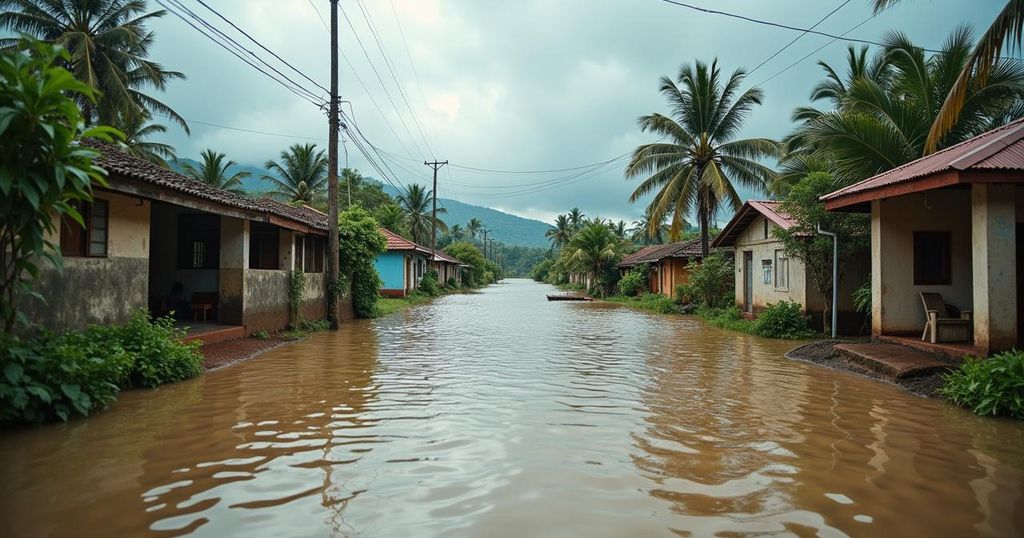Catastrophic Flooding in West Africa: A Climate Crisis Demands Urgent Action
West and Central Africa are suffering from unprecedented flooding, resulting in over 1,000 deaths and affecting more than 4 million individuals, particularly in Nigeria. Experts link the extreme weather to climate change and outline the urgency for better infrastructure and immediate humanitarian aid. The conversation highlights systemic issues, including corruption and inadequate disaster preparedness, which exacerbate the impact of such climate-related catastrophes.
The recent catastrophic floods across West and Central Africa have left thousands dead and millions displaced, particularly in nations such as Nigeria, Mali, Senegal, and Chad. Interviewed by Steve Curwood on Living on Earth, graduate student Nana Mohammed shared insights into the devastation these countries are experiencing, emphasizing the grim statistics reported by local officials. Reports indicate that at least 1,000 fatalities have occurred, with over 4 million individuals significantly affected, especially in Maiduguri, Nigeria, which is now facing severe shortages of food and shelter due to the flooding that has ravaged the region. Local journalist Isma’il Alfa Abdulrahim described the chaotic environment as families struggled for survival, with disturbing accounts of individuals trapped and suffering from injuries without access to basic necessities. He highlighted the remarkable challenges faced in rescue operations, where conditions are compounded by previously existing issues such as drought. Climatologist Dr. Vincent Nduka Ojeh noted that the intensity and atypical nature of the rainfall in Borno State represent unprecedented levels of weather disruption linked to climate change. Despite awareness about the links between these floods and climate change, some locals still perceive these disasters as merely acts of God, indicating a disconnect in understanding the situation’s complexities. One critical factor in the floods’ devastation is attributed to the Alau dam’s collapse, which had been neglected for years, further exacerbating the crisis. Ojeh argued that the lack of resilient infrastructure in Nigeria weakens the nation’s capacity to cope with climate-related disasters, making it more susceptible to dire consequences. Additionally, widespread corruption obstructs the allocation of essential funding for infrastructural improvements that could have mitigated the impacts of climate change. The discussion emphasized the urgent need for developing nations to not only seek assistance from wealthier countries but also to demonstrate readiness and coherent planning for adaptation measures, including the improvement of drainage systems and the construction of flood defenses. As Nigeria attempts to recover from this disaster, immediate safety measures are essential to ensure displaced individuals can regain a semblance of normalcy in their lives, away from emergency camps.
This article addresses the pressing issue of extreme flooding in West and Central Africa, a crisis that has recently escalated and caused serious humanitarian crises. It examines the direct impacts of climate change on vulnerable populations and highlights the intersections between environmental degradation, inadequate infrastructure, and socio-economic challenges. The flooding not only results in immediate loss of life and displacement but also reveals systemic problems within local governance and infrastructure management. By exploring firsthand accounts and expert insights, the article sheds light on the urgent need for both local and international action to address these crises comprehensively.
The recent floods in West Africa, particularly in Nigeria, underscore the urgent need for improving climate resilience in vulnerable regions. With over 1,000 fatalities and millions affected, the crisis reflects not only immediate humanitarian concerns but also systemic failures in infrastructure and governance. Experts recommend the implementation of robust adaptation plans and infrastructure reforms, highlighting the imperative for international financial support to help developing nations address climate challenges effectively. Immediate humanitarian aid is critical to support the displaced populations, whilst long-term strategies must focus on sustainable urban planning and corruption eradication to protect against future disasters.
Original Source: insideclimatenews.org




Post Comment